Health Benefits Of Dates: 18 Proven Benefits For Better Health
There is more to this Middle Eastern fruit than just its delicious taste.
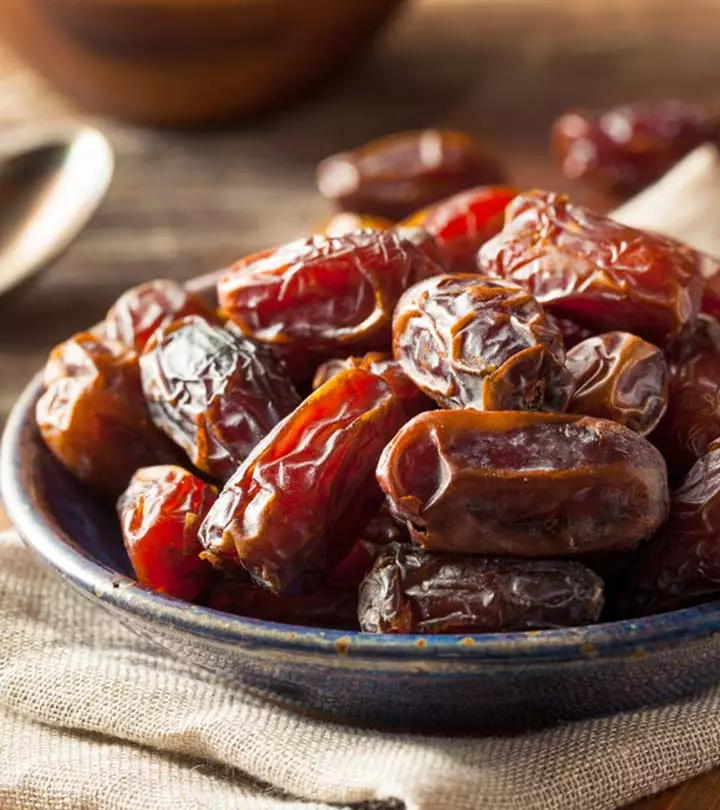
Image: Shutterstock
Dates (Phoenix dactylifera) are the sweetest fruits native to Iraq. The date palm tree produces these fruits, which have long been a staple food in the Middle East.
Dates are particularly rich in vitamins A, B6, and K. Those vitamins promote bone growth and improve eye health. Additionally, dates contain calcium, iron, potassium, protein, manganese, magnesium, phosphorus, copper, and sulfur, enhancing overall body function. For example, they may support a healthy pregnancy and regulate cholesterol levels.
This article discusses the benefits of eating dates, their types, nutritional profile, and recipes. Take a look.
 Know Your Ingredient: Date
Know Your Ingredient: DateWhat Is It?
A brown, dried fruit from the palm tree that has a sweet taste.
What Are Its Benefits?
It helps stimulate bowel movement, reduce cholesterol levels, and promote skin elasticity.
Who Can Consume It?
Anyone can eat it except people with diabetes and irritable bowel syndrome (IBS).
How Often?
You can eat five to six dates a day.
Caution
Excess consumption may cause itchy eyes, weight gain, bloating, and gas.
In This Article
Health Benefits Of Dates
Dates are a delicious and healthy fruit that can offer many benefits for your health. They are packed with nutrients like fiber, vitamins, minerals, and antioxidants. These nutrients can help improve digestion, boost energy levels, support heart health, and even promote weight loss. Here are 18 evidence-based benefits of consuming dates:
1. May Help Regulate Cholesterol Levels
An Israeli study states that intake of dates, even by healthy individuals, may have beneficial effects on cholesterol levels and oxidative stress (1).
Dates contain no cholesterol. They are also rich in iron and have more fiber than bananas. How these factors impact the fruit’s cholesterol-regulating properties is yet to be studied.
2. May Improve Bone Health
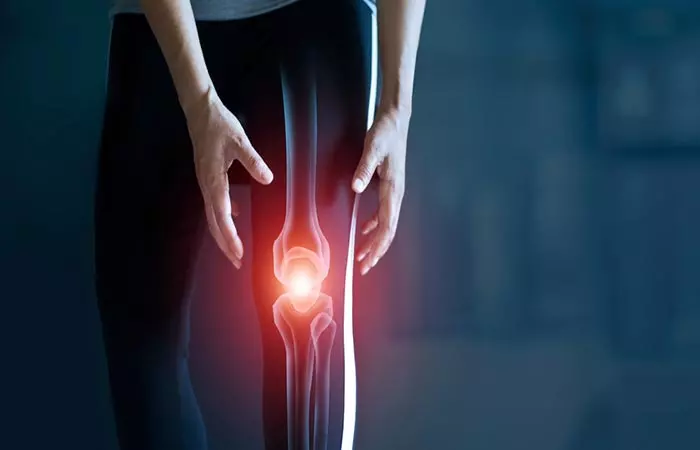
Dates are rich sources of copper, magnesium, selenium, and manganese. All these nutrients are important to keep your bones healthy and prevent bone-related conditions (like osteoporosis).
Dates are also rich in vitamin K. The nutrient is a blood coagulant and helps metabolize your bones (2).
Dates also contain boron. Research shows that boron is one of the other nutrients important for maintaining bone health (3).
3. May Promote Brain Health
Dates have been found to offer protection against oxidative stress and inflammation in the brain. Regular consumption of dates has been linked to a lowered risk of neurodegenerative diseases and better cognitive performances in older individuals (4).
Another animal study has concluded that supplementing with date fruits has the potential to slow down the progression of Alzheimer’si A progressive brain disorder that slowly destroys memory, thinking, and other important mental functions. (5).
In another mouse study, long-term supplementation of dates was found to help prevent inflammation in the brain (6).
4. May Prevent Inflammation
Dates were found to have anti-inflammatory properties (7).
Dates also contain magnesium, which may help boost immunity and fight inflammation. If your diet is low on magnesium, your immune system may not be strong enough to fight inflammation. However, there is limited research in this regard.
5. May Support Healthy Pregnancy

One way dates may help pregnant women is through their calorie count. Pregnant women need about 300 calories more than their non-pregnant peers. But most pregnant women tend to choose high-calorie foods that are low in nutrients. This could cause long-term issues.
Dates can be a healthy replacement. Though a little high in calories, they are immensely nutrient-dense. Anecdotal evidence suggests that the fiber in dates may prevent pregnancy hemorrhoidsi Swollen, enlarged, and inflamed veins in the anus and lower rectum that cause pain, bleeding, and discomfort. .
A Jordan study states that consuming dates in the last four weeks before labor may produce more favorable outcomes. More studies are warranted in this regard (8).
Some anecdotal evidence suggests that dates may also strengthen the uterus’ muscles in the last months of pregnancy.
6. May Help Treat Constipation
In rat studies, the date pulp extract was found to stimulate the gastrointestinal transit activity and can aid in treating constipation. The pulp of the fruit achieves this by correcting the mineral content deregulation that occurs during constipation. The fibers in dates were also found to prevent cancers of the digestive system (9).
Eating a minimum of 20 to 35 grams of fiber every day may help promote digestive health. It also makes stools soft and prevents constipation. Besides having fiber, remember to limit your consumption of foods that contain no fiber at all.
In some cases, reducing fiber intake may help treat constipation (10). Hence, if you have digestive issues, do consult your doctor before consuming dates.
7. May Promote Skin Health

Dates contain vitamins C and D. Anecdotal evidence suggests that these may help promote skin elasticity. The fruit may also help combat other skin issues like itching or rashes. You can incorporate dates into your diet and see the potential results in the long run.
Dates also may have anti-aging benefits. They may prevent the accumulation of melanin in your body that may otherwise lead to skin issues. However, concrete research in this aspect is lacking.
We know that hormones play a major role in skin aging and appearance. Date palm kernel extract is known to have phytohormones that exhibit significant anti-aging effects. The extract may help combat wrinkles, too (11).
8. May Promote Healthy Weight Gain
If you are too lean and want to put on some pounds, you may add this natural sweetener to your diet.
In a study conducted on lambs, weight gain was observed (by as much as 30%) following the consumption of ground date seeds (12). However, more research is needed to understand the same effects in humans.
9. May Regulate Blood Pressure

Dates are rich in potassium (13). The mineral helps manage hypertension (14). One medjool date contains about 167 mg of potassium. This content is relatively high when compared to other fruits. Not taking adequate potassium may also lead to kidney stones, though more research is needed to understand this mechanism.
Fiber also stabilizes blood sugar levels. It also counterbalances the effects of sodium in your diet, and this may help lower blood pressure. The magnesium in the fruit relaxes the muscles in your heart and blood vessels, consequently reducing blood pressure. More studies are needed to reach further conclusions in this regard.
 Did You Know?
Did You Know?10. May Improve Heart Health
A handful of dates a day may improve heart health. Dates can fight free radicals and prevent cardiovascular diseases (15). Anecdotal evidence suggests that the antioxidants in dates may prevent atherosclerosisi A condition characterized by the hardening/thickening of arteries caused by the build-up of fats in and on the artery walls. . These antioxidants may also stimulate cholesterol removal from the artery cells.
Dates also contain isoflavones (the second highest of any fruit) known to reduce the risk of cardiovascular disease. However, more research is warranted in this regard.
Dates contain fiber. As per one UK study, regular intake of fiber may lower the risk of coronary heart disease (16). Fiber also helps in weight management. Ideal body weight could further reduce the risk of heart disease (17).
11. May Prevent Hair Loss
Dates are rich in iron and may promote blood circulation to the scalp. This may promote hair growth. This happens as oxygen is properly dispersed to your entire body, including your scalp. This process may prevent hair loss and stimulate new hair growth. However, limited research is available in this regard.
12. May Enhance Sexual Health
Some research states that the date palm pollen is used in traditional medicine for enhancing male fertility (18). Further research is needed to understand the efficacy of dates in enhancing sexual health. The amino acids in dates may also boost sexual stamina.
13. May Treat Diarrhea
Diarrhea can get better or aggravated with the choice of foods you consume. Dates are rich in potassium and may help improve the condition. Date fruit has antimicrobial properties that act against microbes that cause diarrhea (19).
14. May Reduce The Risk of colon Cancer
Intake of dates may reduce the development of colorectal cancer (20).
Consumption of dates also increases the growth of beneficial bacteria in the gut. This may also promote colon health (19).
15. May Boost Energy Levels
The date fruit contains many nutrients. They are also used in certain countries for instant energy after fasting and to reach satiety easily (21). Dates also contain natural sugars like sucrose, fructose, and glucose. These may offer an energy boost too.
Parris, a health and lifestyle vlogger, started having dates whenever he got sugar cravings and lost around 50 pounds. He used to consume a lot of sugary items, as he had a sweet tooth, but dates helped him switch to a healthy diet. He says, “What seems to be true in my experience is that the sugar in the dates is really bound up in the fruit itself and it doesn’t cause the big insulin release that you would get if you ate 25 grams of table sugar (i).”
16. May Help Prevent Night Blindness
The primary cause of night blindness is a deficiency of vitamin A. Dates are rich in this vitamin as well and can help combat this condition (22). Regions with a higher date consumption seem to have rare incidences of night blindness.
Dates may also help reduce night blindness in geriatric cases (23).
17. May Prevent Intoxication
There is limited research in this regard. Some sources state that dates are added to native beer in Nigeria to make the drink less intoxicating (24).
18. May Prevent Hemorrhoids During Pregnancy
Hemorrhoids are a common complication during pregnancy. They could be the result of an inadequate fiber intake. Dates are excellent sources of fiber. They may help prevent hemorrhoids during pregnancy. However, further studies are required to understand this specific mechanism of dates.
These are the major benefits of dates for women. There are claims that dates benefits may include promoting health and facilitating easier pregnancy. However, there is insufficient information to back them up. We have covered them in the following section.
Insufficient Evidence For
1. May Treat Intestinal Disorders
The fiber in dates may help. But too many dates can overwhelm the bacteria in the large intestine and cause gas. Dates contain some nicotine and this may help in the treatment of intestinal disorders.
2. May Aid In Anemia Treatment
Dates may help treat anemiai A condition where there is a lack of enough healthy red blood cells to circulate oxygen to the body’s tissues. as they contain iron.
3. May Promote Muscle Development
The carbs in dates may help. If you don’t get enough carbs, your body may burn your muscles instead for energy. Dates, being high-carb fruits, may help in muscle development.
4. May Help Reduce Belly Fat
The fiber in dates may help. It makes you feel satiated and discourages overeating. Since dates are sweet, they may also satisfy your sweet tooth and keep you from having unhealthy sweetening foods.
Dates are available in different varieties. In the following section, we will look at the various types of dates.
Key Takeaways
- Dates have cholesterol-regulating properties and promote brain and bone health.
- They may improve immunity, treat constipation, and promote healthy weight gain.
- Rich in potassium, dates may regulate blood pressure and the antioxidants in them help promote heart health.
- An excellent source of natural sugar, dates boost energy levels in the body and increase sexual stamina.
Types Of Date Fruit
Following are the types of dates:
Medjool – This variety has its origins in Morocco. They are large and delicious. They have a toffee-like flavor. You can access the many Medjool dates benefits, such as improved digestion and overall health, by adding it to your diet.
Barhi – These are also called yellow dates. This variety is native to Iraq. They are gentle and have thicker flesh.
Dayri – These dates are lengthy, slim, and black.
Halawy – These are incredibly sweet and small.
Deglet Noor – These are among the best varieties from Tunisia and Algeria. They are semi-dry and not too sweet. They are usually used in cooking.
Hayani – These are grown in Egypt. These dates are gentle and red to black.
Migraf – These dates are popular in southern Yemen. They are large and golden amber.
Iteema – These are native to Algeria and are extremely sweet. They are big and oblong.
Of all these, Medjool is supposed to be the most delicious and nutritious variety. It is the most common variety of black dates. They are rich in antioxidants and fiber and are abundant in potassium as well.
 Fun Fact
Fun FactIn the following section, we will discuss the nutritional profile of dates.
Dates Nutrition Facts*
Dates are a very rich source of vitamins and minerals and are very beneficial for the body. Read more to know the nutritional value of dates in detail. These values pertain to a 100 gram serving of dates.
| Principle | Nutrient Value | Percentage of RDA |
|---|---|---|
| Energy | 277 Kcal | 14% |
| Carbohydrates | 74.97 g | 58% |
| Protein | 1.81g | 3% |
| Total Fat | 0.15 g | |
| Cholesterol | 0 mg | 0% |
| Dietary Fiber | 6.7 g | 18% |
| Vitamins | ||
| Folates | 15 µg | 4% |
| Niacin | 1.610 mg | 10% |
| Pantothenic acid | 0.805 mg | 16% |
| Pyridoxine | 0.249 mg | 19% |
| Riboflavin | 0.060 mg | 4.5% |
| Thiamin | 0.050 mg | 4% |
| 149 IU | 5% | |
| Vitamin C | 0 mg | 0% |
| Vitamin K | 2.7 µg | 2% |
| Electrolytes | ||
| Sodium | 1 mg | 0% |
| Potassium | 696 mg | 16% |
| Minerals | ||
| Calcium | 64 mg | 6.5% |
| Copper | 0.362 mg | 40% |
| Iron | 0.90 mg | 11% |
| Magnesium | 54 mg | 13% |
| Manganese | 0.296 mg | 13% |
| Phosphorus | 62 mg | 9% |
| Zinc | 0.44 mg | 4% |
| Phyto-nutrients | ||
| Carotene-ß | 89 µg | — |
| Crypto-xanthin-ß | 0 µg | — |
| Lutein-zeaxanthin | 23 µg | — |
*values sourced from USDA, dates, medjool
Dates are especially rich in vitamins B6, A, and K. These help in bone development and improve eye health. The fiber in dates improves intestinal health and naturally reduces cholesterol. It also may reduce the risk of stomach and colon cancers. Other minerals like calcium, iron, potassium, protein, manganese, magnesium, phosphorus, copper, and sulfur in dates promote overall body functioning. They improve metabolism and immunity as well. Folate is good for pregnancy. Thiamin (nervous system), niacin (cholesterol levels), and riboflavin (energy production) are the other vitamins the fruit is rich in.
Dates can be eaten in several ways. Here we have discussed some simple ways you can add them to your diet.
What Are The Best Ways To Eat Dates?
- You can take them as a stuffed snack. Remove the pits and include dates with walnuts, almonds, cashews, and pecans for a delightful snack.
- You can also mix diced dates with your breakfast cereal.
- Wrap dates with tuna or chicken salad and other vegetables.
- You can dice dates and serve them along with frozen vanilla yogurt.
Enjoying dates the way they are is the simplest way of eating them.
You can also soak dates (the dry ones) to rehydrate them, and then eat them. Date syrup works well too. It has antibacterial properties that are believed to be more effective than those in honey.
Fresh and dry dates are the two common variants available on the market. They are distinct in their own ways. We have discussed their differences below.
Fresh Dates Vs. Dry Dates
Fresh dates are soft, and dry dates are harder. They naturally contain less moisture than fresh dates.
We also can find dried dates that are fresh. These are fresh soft dates that are deliberately dried over a period.
From a nutritional standpoint, fresh dates are not very different from dry dates. But they are different from dried dates.
From a nutritional standpoint, dry dates offer more health benefits than the fresh ones. Dried dates have double the amount of carbohydrates than fresh dates. They are also a better source of fiber. Dried dates also contain higher levels of calcium and iron, but fresh dates win in vitamin C.
You can consume dates any way you want. You may also try these delicious date recipes.
Any Popular Date Recipe?
1. Dates Milkshake
What You Need
- Whole milkshake
- A handful of good quality dates
Directions
- Mix the two ingredients. You can also add walnuts, cashews, and almonds to make the milkshake more nutritious.
2. Banana Date Smoothie
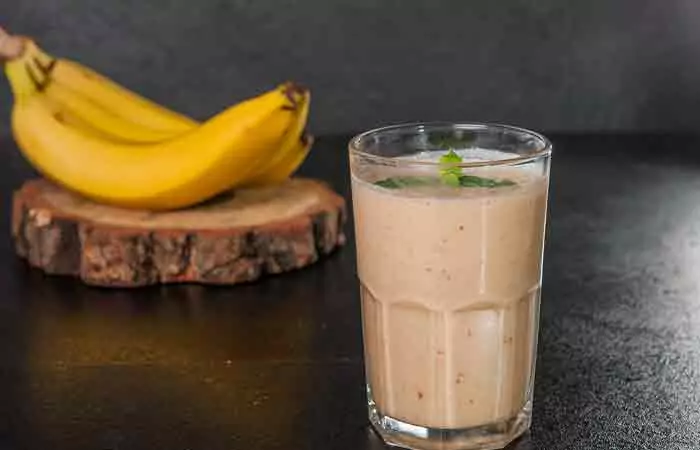
What You Need
- 2 ripe bananas
- 6 pitted dates
- 1 cup of almond milk
- 1/2 cup of Greek yogurt
- 1/2 teaspoon of vanilla extract
- 1/2 teaspoon of cinnamon
Directions
- Slice the bananas into smaller pieces.
- Chop the dates into smaller bits for easier blending.
- Add the sliced bananas, chopped dates, almond milk, Greek yogurt, vanilla extract, and cinnamon in a blender.
- Blend until you achieve a smooth and creamy consistency.
- Pour it into a glass and enjoy.
3. Date Syrup

What You Need
- 1 cup of pitted dates
- 1 cup of water
- 1/2 teaspoon of lemon juice (optional)
Directions
- Combine the dates and water in a saucepan.
- Simmer over low heat for 15-20 minutes until the dates soften and the mixture thickens.
- Add the lemon juice for a tangy flavor.
- Allow it to cool, then blend until smooth.
- Strain the mixture to remove any solids.
Selection And Storage
Selection
- Dates are generally sold whole, packaged in narrow boxes, or pressed into blocks.
- While buying fresh dates, look for plump, moist, and unbruised fruits that are soft with glossy skins.
- Fresh dates can be slightly wrinkled, but they should not feel hard or have crystallized sugar on their skins.
- Fresh and dried dates have a similar appearance, except that dried dates are a little wrinkly.
- They should look plump and glossy and have an even color.
Storage
- Fresh dates, when kept in an airtight container in the refrigerator, can be stored for up to 6 months.
- Dried dates, having a longer shelf life, can be stored in the same manner for up to 1 year.
- Freezing dates extend their lifespan when kept in an airtight plastic bag or container.
Infographic: Health Benefits Of Dates
Dates are excellent sources of many beneficial nutrients and can help maintain overall health. Regular consumption of dates may have several benefits, like promoting heart health and cancer prevention.
The infographic below elucidates various benefits of eating dates. Check it out!
Some thing wrong with infographic shortcode. please verify shortcode syntax
The benefits of dates can be attributed to their essential nutrients, fiber, and antioxidants. You can include them in your diet in several ways. They may help regulate cholesterol levels, improve bone health, promote brain health, reduce inflammation, and support a healthy pregnancy. They are available in different types, and you can have them as a stuffed snack or mix them with breakfast cereal. Add them to your daily diet to enjoy all their benefits. However, avoid overconsumption to prevent the side effects of dates.
Frequently Asked Questions
Is date a nut?
Date is a fruit of the date palm tree, and not a nut.
How many dates should I eat in a day?
About 3 to 5 dates a day would do. These nutrient-rich fruits may boost immunity when they are consumed in the recommended quantities.
What are the benefits of taking dates with milk?
In addition to getting all the benefits of dates that we have listed, you’ll also get the added goodness of calcium. This could be a superb diet to boost growth and maintain your overall health.
Can I have dates with tea?
Yes. But keep in mind that 100 grams of dates have about 60 grams of sugar. Hence, ensure your tea doesn’t have added sugar.
Can individualswith diabetes eat dates?
Dates are high in natural sugar and are a good source of fiber. Therefore, there are many benefits of dates for diabetes patients. However, check with your healthcare provider before consuming dates in this case.
Is eating an odd number of dates more healthy?
This is nothing more than a placebo effect. Eating dates in limited numbers can offer benefits.
Can dates be eaten daily?
Absolutely. Dates are delicious and nutritious. They contain several minerals and vitamins, and fiber.
How many dates should I eat for treating constipation?
There is no specific number. But if you stick to normal amounts of dates every day, you may not even suffer from constipation in the first place.
What are the health benefits of jujube dates?
Jujube dates are also called Chinese dates (or red dates). They help treat insomnia and anxiety. They also improve immunity and liver function.
Can we eat dates on an empty stomach?
Eating dates on an empty stomach has many benefits. Dates are rich in potassium and calcium that help regulate blood glucose and blood pressure levels. They also can promote energy.
Can I drink water after eating dates?
Yes, but only after an hour from consumption. Drinking water immediately after consuming any fruit may dilute the enzymes in the intestine that are essential for the digestion process.
Can I eat dates after a meal?
Yes, you can eat dates after a meal. Dates are rich in fiber. Fiber slows down the digestion process and controls blood sugar levels (25).
Do dates cause gas?
Dates usually don’t cause gas, unless someone is sensitive to their high fiber content. The sugars in dates may also cause gas.
Can we soak dates in water overnight?
We may soak dates in water overnight. However, there is no evidence stating this method is good or bad.
Do dried dates go bad?
When stored properly at room temperature, dried dates have a long shelf life compared to other fruits. You can revive dried dates by placing them in boiling water for 10 minutes.
Illustration: Evidence-Based Health Benefits Of Dates, Nutrition, & Types
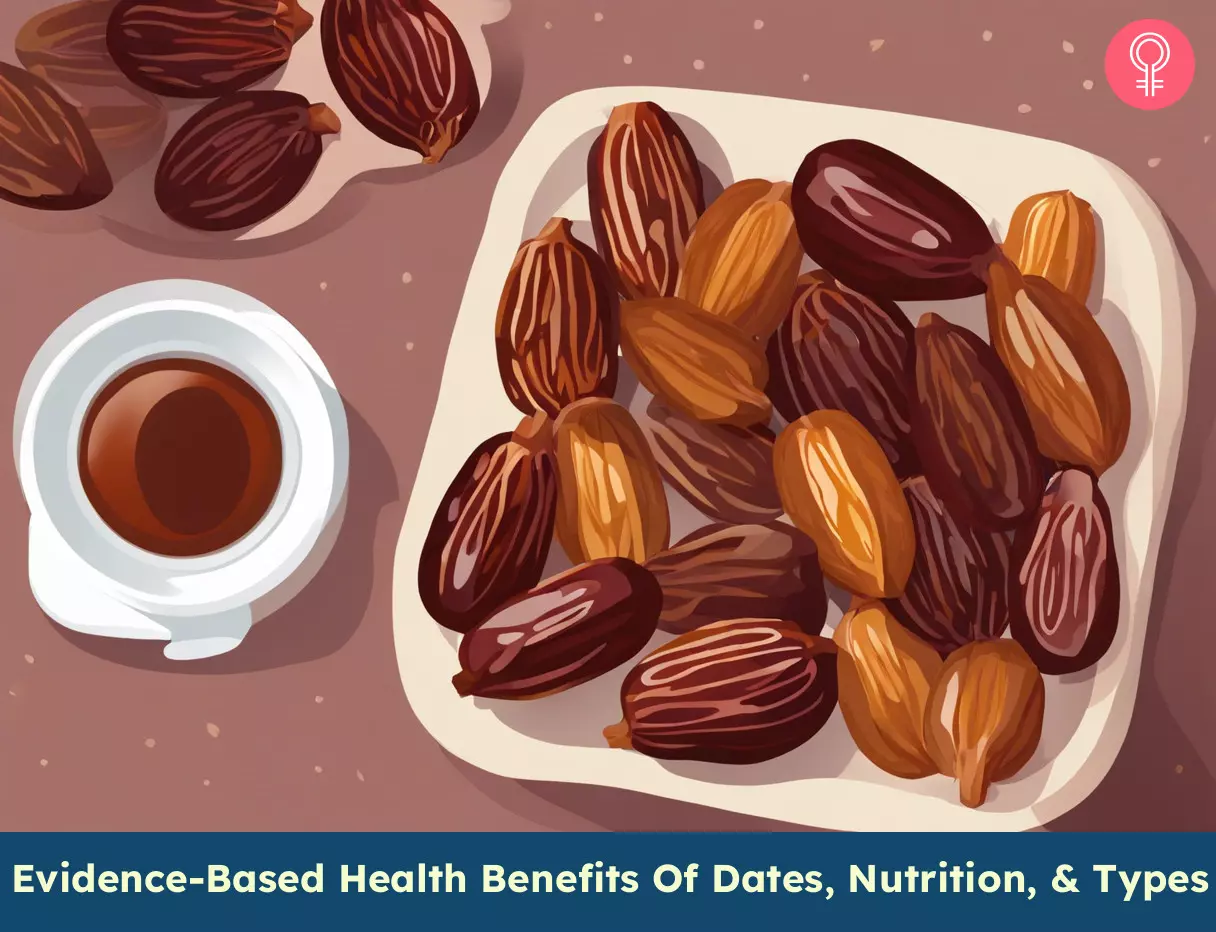
Image: Stable Diffusion/StyleCraze Design Team
References
Articles on StyleCraze are backed by verified information from peer-reviewed and academic research papers, reputed organizations, research institutions, and medical associations to ensure accuracy and relevance. Read our editorial policy to learn more.
- Rock, Wasseem, et al. “Effects of date (Phoenix dactylifera L., Medjool or Hallawi Variety) consumption by healthy subjects on serum glucose and lipid levels and on serum oxidative status: a pilot study.” Journal of agricultural and food chemistry 57.17 (2009): 8010-8017.
https://pubmed.ncbi.nlm.nih.gov/19681613/ - Akbari, Solmaz, and Amir AlirezaRasouli-Ghahroudi. “Vitamin K and bone metabolism: a review of the latest evidence in preclinical studies.” BioMed research international 2018 (2018).
https://www.ncbi.nlm.nih.gov/pmc/articles/PMC6040265/ - Palacios, Cristina. “The role of nutrients in bone health, from A to Z.” Critical reviews in food science and nutrition 46.8 (2006): 621-628.
https://pubmed.ncbi.nlm.nih.gov/17092827/ - Essa, Musthafa Mohamed, Mohammed Akbar, and Mohammed Abdul Sattar Khan. “Beneficial effects of date palm fruits on neurodegenerative diseases.” Neural regeneration research 11.7 (2016): 1071.
https://www.ncbi.nlm.nih.gov/pmc/articles/PMC4994443/ - Subash, Selvaraju, et al. “Diet rich in date palm fruits improves memory, learning and reduces beta amyloid in transgenic mouse model of Alzheimer’s disease.” Journal of Ayurveda and integrative medicine 6.2 (2015): 111.
https://pubmed.ncbi.nlm.nih.gov/26167001/ - Essa, Musthafa Mohamed, et al. “Long-term dietary supplementation of pomegranates, figs and dates alleviate neuroinflammation in a transgenic mouse model of Alzheimer’s disease.” PLoS One 10.3 (2015).
https://www.ncbi.nlm.nih.gov/pmc/articles/PMC4373715/ - Rahmani, Arshad H., et al. “Therapeutic effects of date fruits (Phoenix dactylifera) in the prevention of diseases via modulation of anti-inflammatory, anti-oxidant and anti-tumour activity.” International journal of clinical and experimental medicine 7.3 (2014): 483.
https://www.ncbi.nlm.nih.gov/pmc/articles/PMC3992385/ - Al-Kuran, O., et al. “The effect of late pregnancy consumption of date fruit on labour and delivery.” Journal of obstetrics and gynaecology 31.1 (2011): 29-31.
https://pubmed.ncbi.nlm.nih.gov/21280989/ - Souli, Abdellaziz, et al. “Effects of dates pulp extract and palm sap (Phoenix dactylifera L.) on gastrointestinal transit activity in healthy rats.” Journal of medicinal food 17.7 (2014): 782-786.
https://www.ncbi.nlm.nih.gov/pmc/articles/PMC4098977/ - Ho, Kok-Sun, et al. “Stopping or reducing dietary fiber intake reduces constipation and its associated symptoms.” World Journal of Gastroenterology: WJG 18.33 (2012): 4593.
https://www.ncbi.nlm.nih.gov/pmc/articles/PMC3435786/ - Bauza, E., et al. “Date palm kernel extract exhibits antiaging properties and significantly reduces skin wrinkles.” International journal of tissue reactions 24.4 (2002): 131-136.
https://pubmed.ncbi.nlm.nih.gov/12779247/ - Al-Suwaiegh, S. B. “Effect of feeding date pits on milk production, composition and blood parameters of lactating ardi goats.” Asian-Australasian journal of animal sciences 29.4 (2016): 509.
https://www.ncbi.nlm.nih.gov/pmc/articles/PMC4782085/ - Assirey, Eman Abdul Rahman. “Nutritional composition of fruit of 10 date palm (Phoenix dactylifera L.) cultivars grown in Saudi Arabia.” Journal of Taibah University for science 9.1 (2015): 75-79.
https://www.sciencedirect.com/science/article/pii/S1658365514000703 - Houston, Mark C. “The importance of potassium in managing hypertension.” Current hypertension reports 13.4 (2011): 309-317.
https://pubmed.ncbi.nlm.nih.gov/21403995/ - Shahdadi, F., H. O. Mirzaei, and A. DaraeiGarmakhany. “Study of phenolic compound and antioxidant activity of date fruit as a function of ripening stages and drying process.” Journal of food science and technology 52.3 (2015): 1814-1819.
https://www.ncbi.nlm.nih.gov/pmc/articles/PMC4348321/ - Threapleton, Diane E., et al. “Dietary fibre intake and risk of cardiovascular disease: systematic review and meta-analysis.” Bmj 347 (2013): f6879.
https://www.ncbi.nlm.nih.gov/pmc/articles/PMC3898422/ - Slavin, Joanne. “Fiber and prebiotics: mechanisms and health benefits.” Nutrients 5.4 (2013): 1417-1435.
https://www.ncbi.nlm.nih.gov/pmc/articles/PMC3705355/ - Kotta, Sabna, Shahid H. Ansari, and Javed Ali. “Exploring scientifically proven herbal aphrodisiacs.” Pharmacognosy reviews 7.13 (2013): 1.
https://www.ncbi.nlm.nih.gov/pmc/articles/PMC3731873/ - Al-Alawi, Reem A., et al. “Date palm tree (Phoenix dactylifera L.): natural products and therapeutic options.” Frontiers in plant science 8 (2017): 845.
https://www.ncbi.nlm.nih.gov/pmc/articles/PMC5440559/ - Eid, Noura, et al. “The impact of date palm fruits and their component polyphenols, on gut microbial ecology, bacterial metabolites and colon cancer cell proliferation.” Journal of nutritional science 3 (2014).
https://www.ncbi.nlm.nih.gov/pmc/articles/PMC4473134/ - Yasawy, Mohammed I. “The unexpected truth about dates and hypoglycemia.” Journal of family & community medicine 23.2 (2016): 115.
https://www.ncbi.nlm.nih.gov/pmc/articles/PMC4859097/ - Al Binali, HA Hajar. “Night blindness and ancient remedy.” Heart views: the official journal of the Gulf Heart Association 15.4 (2014): 136.
https://www.ncbi.nlm.nih.gov/pmc/articles/PMC4348990/ - Verma, Priyanka. “Effect of dates in lowering ldl level in geriatric cases.” Health Science Journal 10.5 (2016): 1.
https://www.hsj.gr/medicine/effect-of-dates-in-lowering-ldl-level-in-geriatric-cases.php?aid=11309 - Mahmoudi, Hossein, et al. “Enhancing date palm processing, marketing and pest control through organic culture.” Journal of Organic Systems 3.2 (2008): 29-39.
https://www.researchgate.net/publication/228883535_Enhancing_date_palm_processing_marketing_and_pest_control_through_organic_culture - Riccardi, Gabriele, and Angela A. Rivellese. “Effects of dietary fiber and carbohydrate on glucose and lipoprotein metabolism in diabetic patients.” Diabetes care 14.12 (1991): 1115-1125.
https://pubmed.ncbi.nlm.nih.gov/1663443/
Read full bio of Mollie Meldahl
Read full bio of Ravi Teja Tadimalla
Read full bio of Arshiya Syeda
Read full bio of Sindhu Koganti






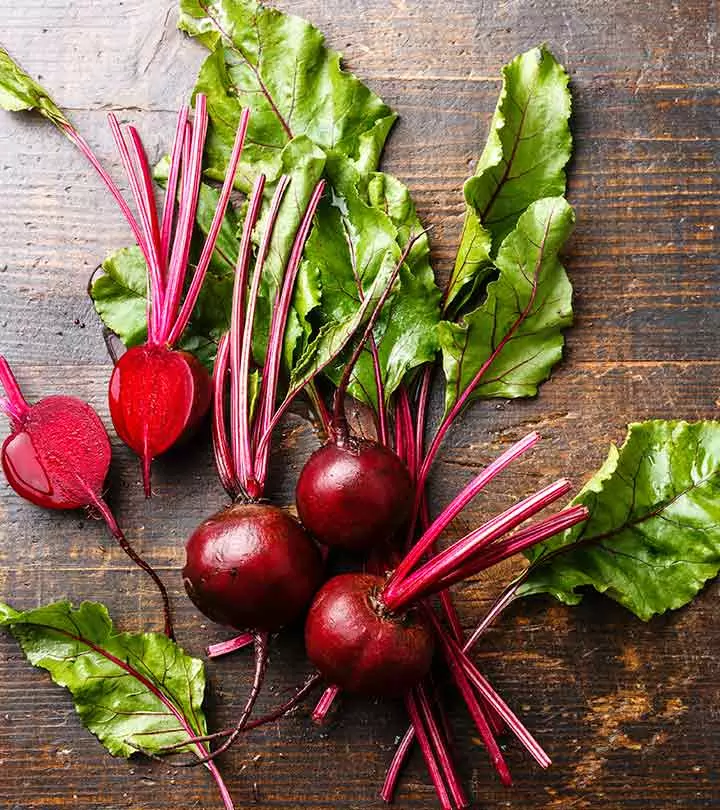
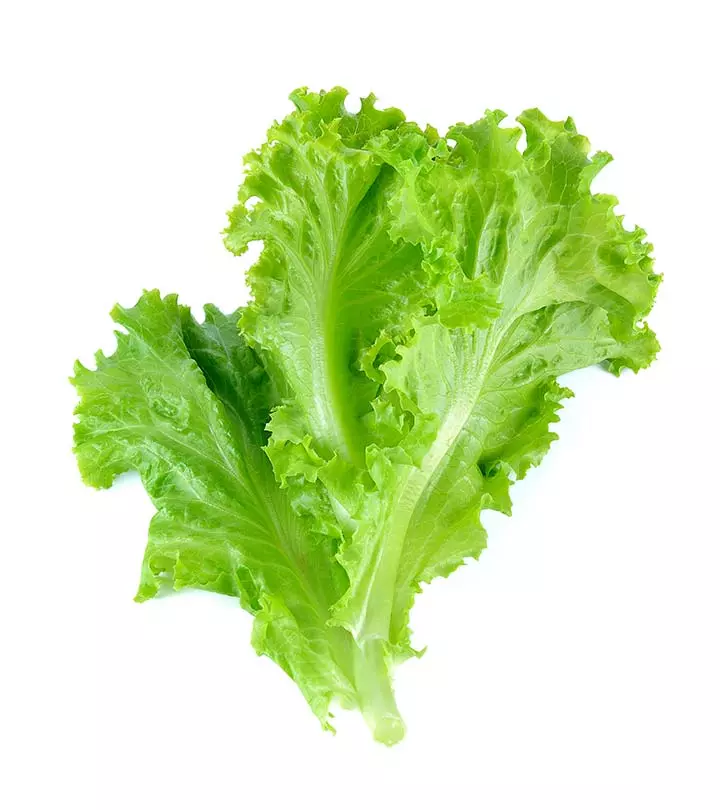

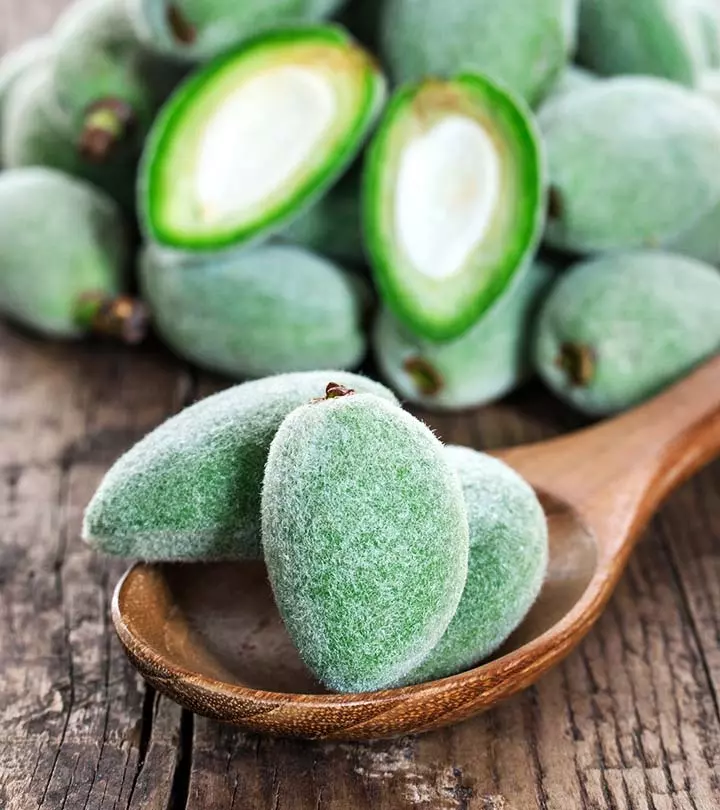
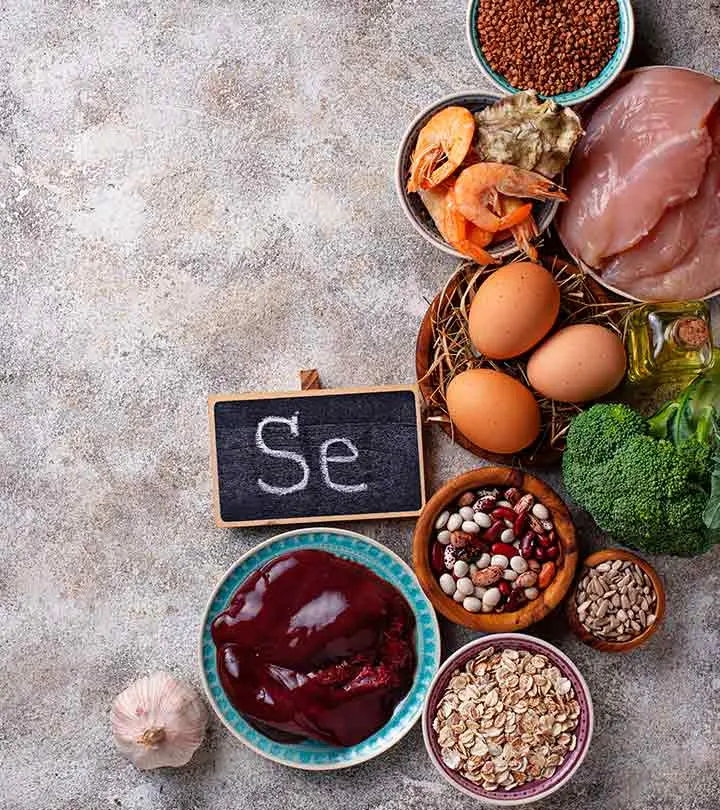

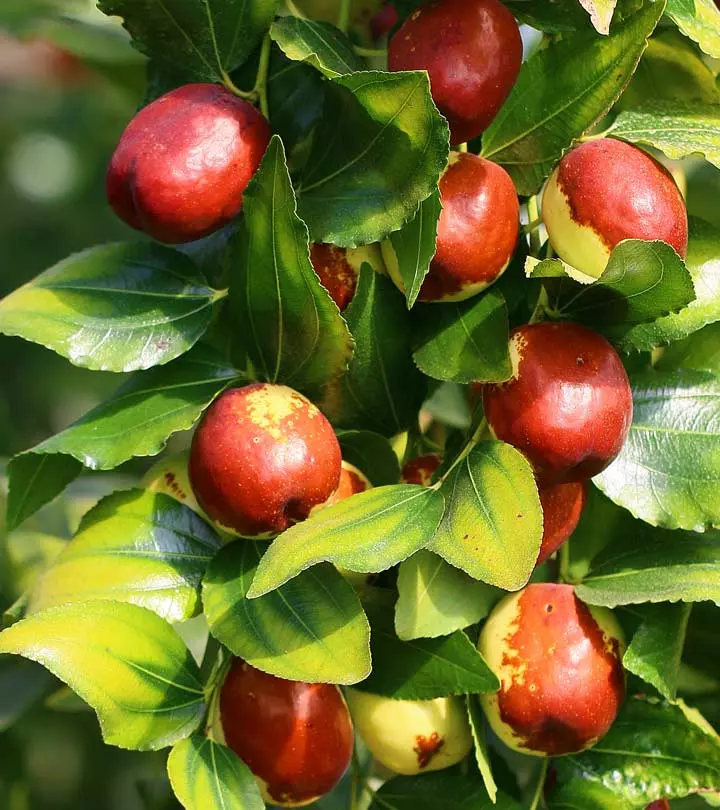


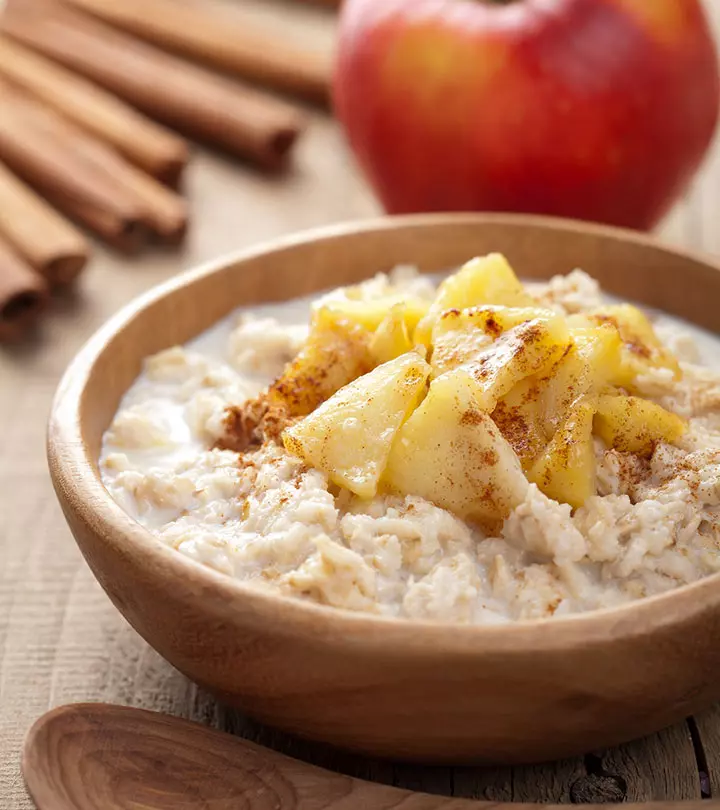
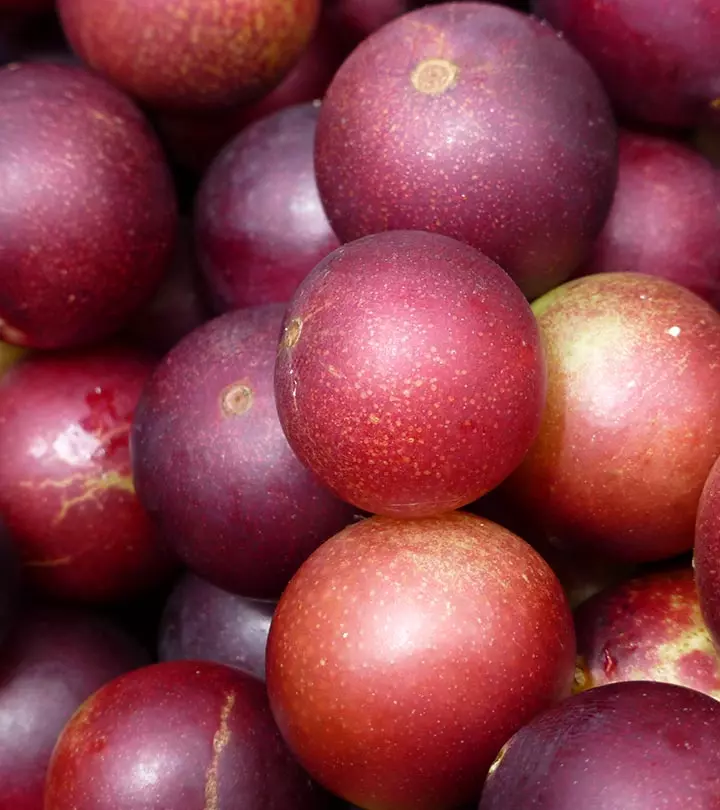
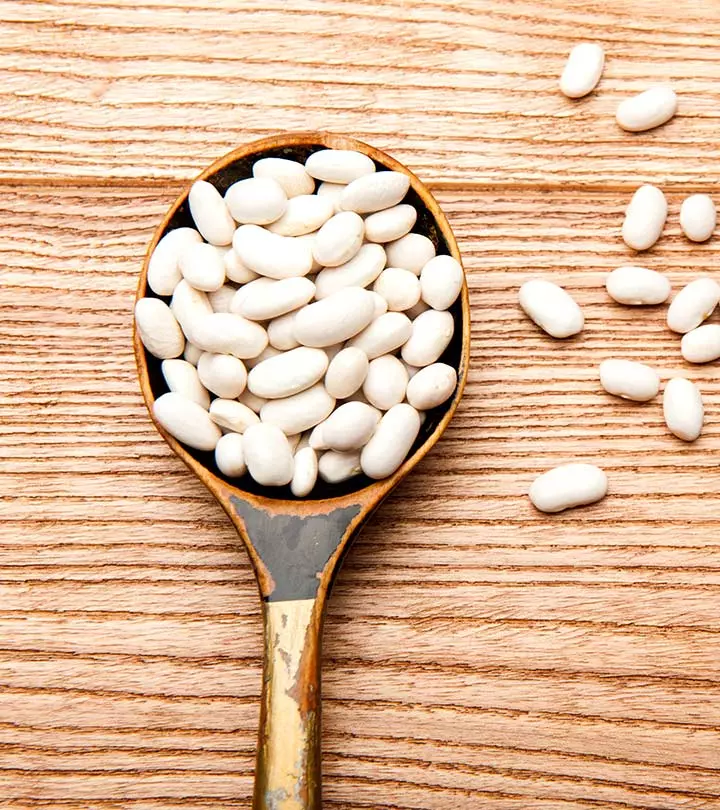


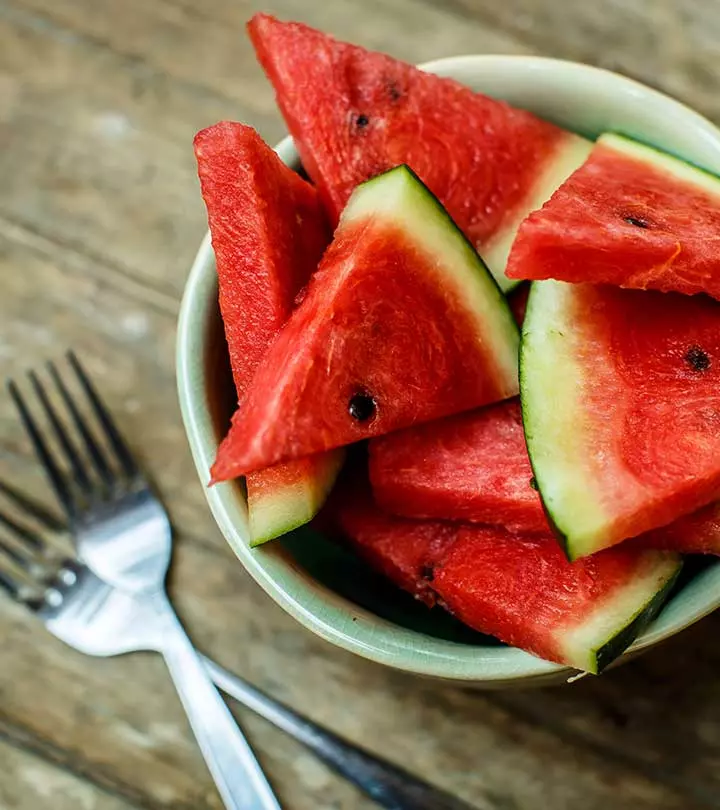
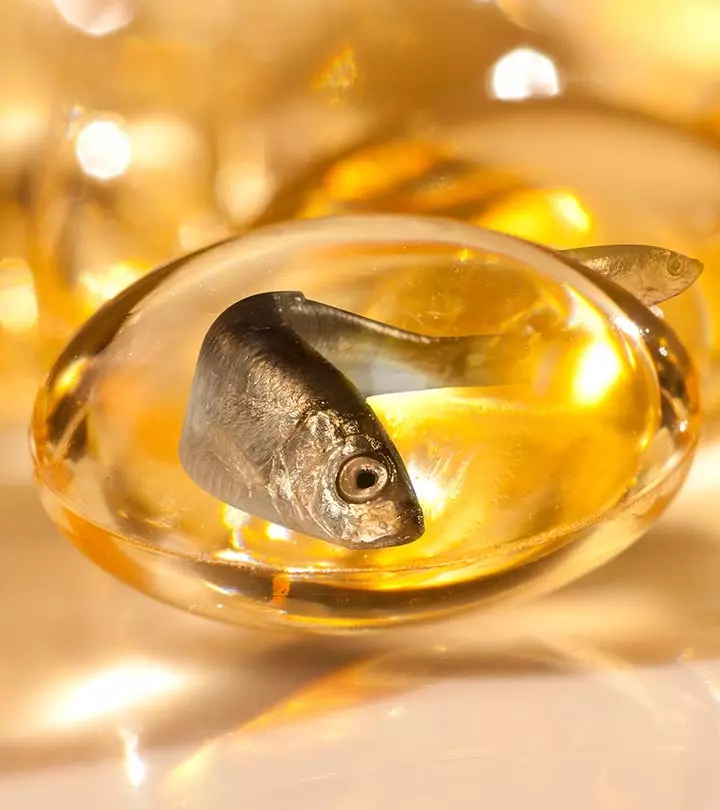

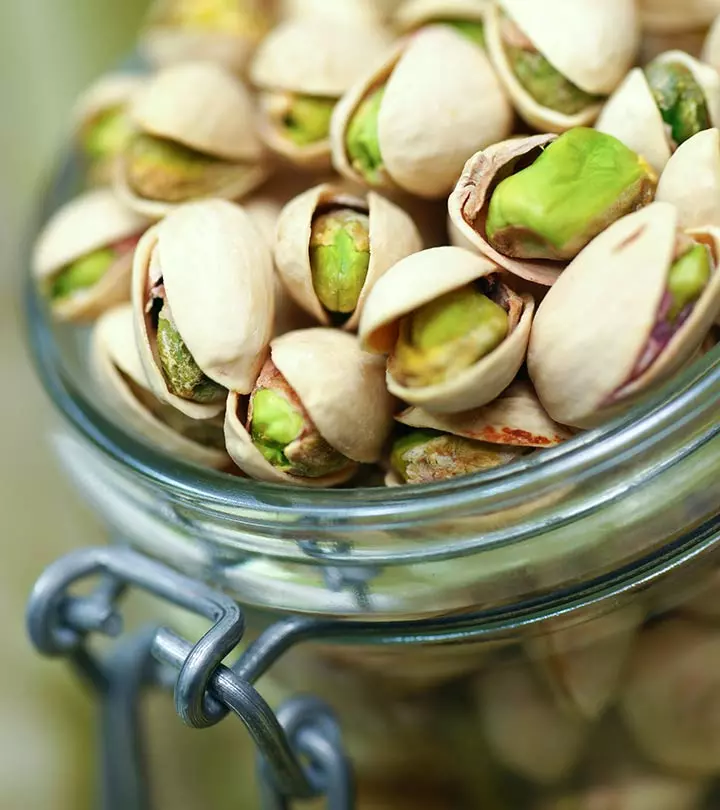
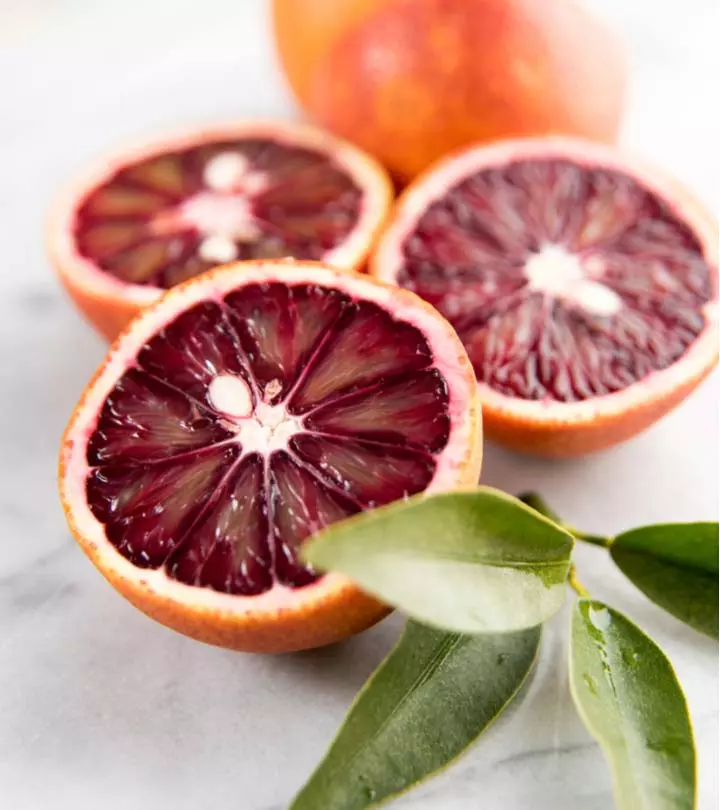

Community Experiences
Join the conversation and become a part of our empowering community! Share your stories, experiences, and insights to connect with other beauty, lifestyle, and health enthusiasts.